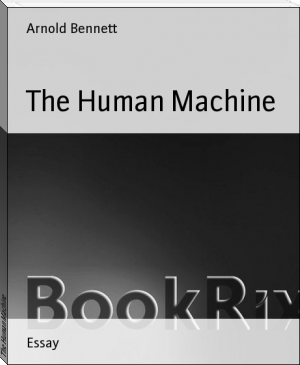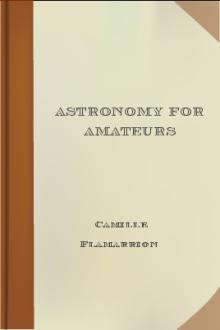The Human Machine - Arnold Bennett (sight word readers .TXT) 📗

- Author: Arnold Bennett
Book online «The Human Machine - Arnold Bennett (sight word readers .TXT) 📗». Author Arnold Bennett
Take the case of an individual with an imperfect idea of honesty. Now, that individual is the consequence of his father and mother and his environment, and his father and mother of theirs, and so backwards to the single-celled protoplasm. That individual is a result of the cosmic order, the inevitable product of cause and effect. We know that. We must admit that he is just as much a fact of the universe as a shower of rain or a storm at sea that swallows a ship. We freely grant in the abstract that there must be, at the present stage of evolution, a certain number of persons with unfair minds. We are quite ready to contemplate such an individual with philosophy--until it happens that, in the course of the progress of the solar system, he runs up against ourselves. Then listen to the outcry! Listen to the continual explosions of a righteous man aggrieved! The individual may be our clerk, cashier, son, father, brother, partner, wife, employer. We are ill-used! We are being treated unfairly! We kick; we scream. We nourish the inward sense of grievance that eats the core out of content. We sit down in the rain. We decline to think of umbrellas, or to run to shelter.
We care not that that individual is a fact which the universe has been slowly manufacturing for millions of years. Our attitude implies that we want eternity to roll back and begin again, in such wise that we at any rate shall not be disturbed. Though we have a machine for the transmutation of facts into food for our growth, we do not dream of using it. But, we say, he is doing us harm! Where? In our minds. He has robbed us of our peace, our comfort, our happiness, our good temper. Even if he has, we might just as well inveigh against a shower. But has he? What was our brain doing while this naughty person stepped in and robbed us of the only possessions worth having? No, no! It is not that he has done us harm--the one cheerful item in a universe of stony facts is that no one can harm anybody except himself--it is merely that we have been silly, precisely as silly as if we had taken a seat in the rain with a folded umbrella by our side.... The machine is at fault. I fancy we are now obtaining glimpses of what that phrase really means.
VII
WHAT 'LIVING' CHIEFLY IS
It is in intercourse--social, sentimental, or business--with one's fellows that the qualities and the condition of the human machine are put to the test and strained. That part of my life which I conduct by myself, without reference--or at any rate without direct reference--to others, I can usually manage in such a way that the gods do not positively weep at the spectacle thereof. My environment is simpler, less puzzling, when I am alone, my calm and my self-control less liable to violent fluctuations. Impossible to be disturbed by a chair! Impossible that a chair should get on one's nerves! Impossible to blame a chair for not being as reasonable, as archangelic as I am myself! But when it comes to people!... Well, that is 'living,' then! The art of life, the art of extracting all its power from the human machine, does not lie chiefly in processes of bookish-culture, nor in contemplations of the beauty and majesty of existence. It lies chiefly in keeping the peace, the whole peace, and nothing but the peace, with those with whom one is 'thrown.' Is it in sitting ecstatic over Shelley, Shakespeare, or Herbert Spencer, solitary in my room of a night, that I am 'improving myself' and learning to live? Or is it in watching over all my daily human contacts? Do not seek to escape the comparison by insinuating that I despise study, or by pointing out that the eternal verities are beyond dailiness. Nothing of the kind! I am so 'silly' about books that merely to possess them gives me pleasure. And if the verities are good for eternity they ought to be good for a day. If I cannot exchange them for daily coin--if I can't buy happiness for a single day because I've nothing less than an eternal verity about me and nobody has sufficient change--then my eternal verity is not an eternal verity. It is merely an unnegotiable bit of glass (called a diamond), or even a note on the Bank of Engraving.
I can say to myself when I arise in the morning: 'I am master of my brain. No one can get in there and rage about like a bull in a china shop. If my companions on the planet's crust choose to rage about they cannot affect _me_! I will not let them. I have power to maintain my own calm, and I will. No earthly being can force me to be false to my principles, or to be blind to the beauty of the universe, or to be gloomy, or to be irritable, or to complain against my lot. For these things depend on the brain; cheerfulness, kindliness, and honest thinking are all within the department of the brain. The disciplined brain can accomplish them. And my brain is disciplined, and I will discipline it more and more as the days pass. I am, therefore, independent of hazard, and I will back myself to conduct all intercourse as becomes a rational creature.' ... I can say this. I can ram this argument by force of will into my brain, and by dint of repeating it often enough I shall assuredly arrive at the supreme virtues of reason. I should assuredly conquer--the brain being such a machine of habit--even if I did not take the trouble to consider in the slightest degree what manner of things my fellow-men are--by acting merely in my own interests. But the way of perfection (I speak relatively) will be immensely shortened and smoothed if I do consider, dispassionately, the case of the other human machines. Thus:--
The truth is that my attitude towards my fellows is fundamentally and totally wrong, and that it entails on my thinking machine a strain which is quite unnecessary, though I may have arranged the machine so as to withstand the strain successfully. The secret of smooth living is a calm cheerfulness which will leave me always in full possession of my reasoning faculty--in order that I may live by reason instead of by instinct and momentary passion. The secret of calm cheerfulness is kindliness; no person can be consistently cheerful and calm who does not consistently think kind thoughts. But how can I be kindly when I pass the major portion of my time in blaming the people who surround me--who are part of my environment? If I, blaming, achieve some approach to kindliness, it is only by a great and exhausting effort of self-mastery. The inmost secret, then, lies in not blaming, in not judging and emitting verdicts. Oh! I do not blame by word of mouth! I am far too advanced for such a puerility. I keep the blame in my own breast, where it festers. I am always privately forgiving, which is bad for me. Because, you know, there is nothing to forgive. I do not have to forgive bad weather; nor, if I found myself in an earthquake, should I have to forgive the earthquake.
All blame, uttered or unexpressed, is wrong. I do not blame myself. I can explain myself to myself. I can invariably explain myself. If I forged a friend's name on a cheque I should explain the affair quite satisfactorily to myself. And instead of blaming myself I should sympathise with myself for having been driven into such an excessively awkward corner. Let me examine honestly my mental processes, and I must admit that my attitude towards others is entirely different from my attitude towards myself. I must admit that in the seclusion of my mind, though I say not a word, I am constantly blaming others because I am not happy. Whenever I bump up against an opposing personality and my smooth progress is impeded, I secretly blame the opposer. I act as though I had shouted to the world: 'Clear out of the way, every one, for I am coming!' Every one does not clear out of the way. I did not really expect every one to clear out of the way. But I act, within, as though I had so expected. I blame. Hence kindliness, hence cheerfulness, is rendered vastly more difficult for me.
What I ought to do is this! I ought to reflect again and again, and yet again, that the beings among whom I have to steer, the living environment out of which I have to manufacture my happiness, are just as inevitable in the scheme of evolution as I am myself; have just as much right to be themselves as I have to be myself; are precisely my equals in the face of Nature; are capable of being explained as I am capable of being explained; are entitled to the same latitude as I am entitled to, and are no more responsible for their composition and their environment than I for mine. I ought to reflect again and again, and yet again, that they all deserve from me as much sympathy as I give to myself. Why not? Having thus reflected in a general manner, I ought to take one by one the individuals with whom I am brought into frequent contact, and seek, by a deliberate effort of the imagination and the reason, to understand them, to understand why they act thus and thus, what their difficulties are, what their 'explanation' is, and how friction can be avoided. So I ought to reflect, morning after morning, until my brain is saturated with the cases of these individuals. Here is a course of discipline. If I follow it I shall gradually lose the preposterous habit of blaming, and I shall have laid the foundations of that quiet, unshakable self-possession which is the indispensable preliminary of conduct according to reason, of thorough efficiency in the machine of happiness. But something in me, something distinctly base, says: 'Yes. The put-yourself-in-his-place business over again! The do-unto-others business over again!' Just so! Something in me is ashamed of being 'moral.' (You all know the feeling!) Well, morals are naught but another name for reasonable conduct; a higher and more practical form of egotism--an egotism which, while freeing others, frees myself. I have tried the lower form of egotism. And it has failed. If I am afraid of being moral, if I prefer to cut off my nose to spite my face, well, I must accept the consequences. But truth will prevail.
VIII
THE DAILY FRICTION
It is with common daily affairs that I am now dealing, not with heroic enterprises, ambitions, martyrdoms. Take the day, the





Comments (0)